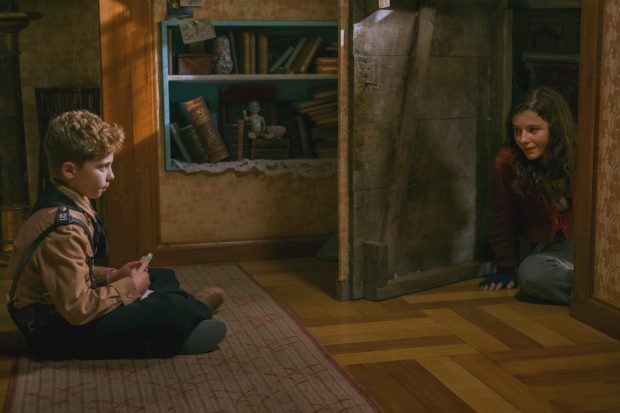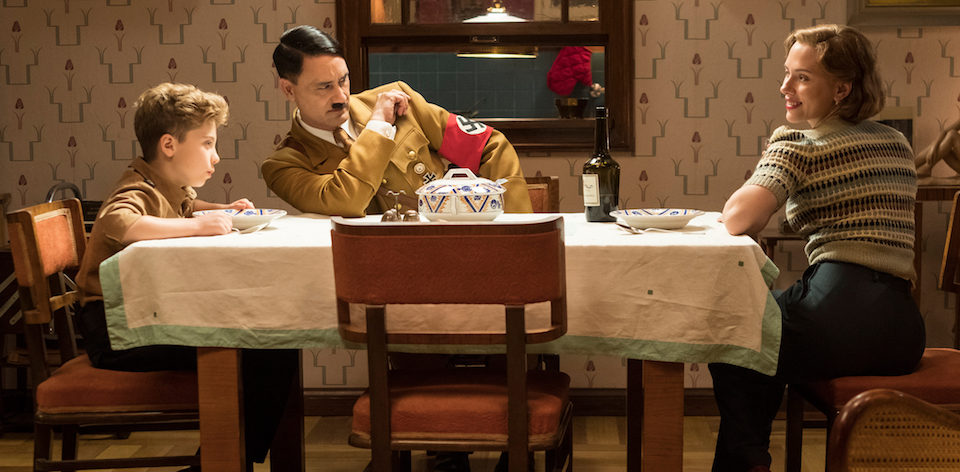A film about Nazis in 2019 is not as unexpected as it might have been a few years ago. You know, because of that whole international wave of white supremacy that poses a very real threat to democracies across the globe. Still, there’s nothing about this film that is entirely expected.
Loosely based on Christine Leunens’s book Caging Skies, Waititi’s screenplay introduces us to Johannes “Jojo” Betzler (Roman Griffin Davis), an enthusiastically nationalistic 10-year-old boy living in Nazi Germany with his mother Rosie (Scarlett Johansson). Jojo is so jingoistic that he imagines Adolf Hitler (Waititi) as his best friend, yet his indoctrination is put to the test with the discovery that Rosie has been hiding Elsa (Thomasin McKenzie), a young Jewish girl, in their home.
Waititi’s idiosyncratic humour shines through the first act – and make no mistake, it is very funny – disarming us with a smile and sideswiping us with a barrage of one-liners. Yet once the initial jokes have run their course, the surprisingly sanitised and politically centrist combination of Wes Anderson by way of Roberto Benigni doesn’t quite glue all its ideas together. Like the latter, Waititi almost runs the risk of diminishing the impact of the Second World War by turning Nazism into a cinematic reference rather than the source of historical horror.

Which is a real problem. In a 2018 US poll, two-thirds of ‘Millennials’ could not correctly identify what Auschwitz was. If Nazis are merely characters in media – whether it is the foe in the Indiana Jones films, something to shoot at in Wolfenstein or lampooned in JOJO RABBIT – there’s a tangible possibility that the real world threat of neo-Nazism is taken less seriously.
The cast is excellent though, especially the two young leads. While their exchanges are frequently didactic, they help us navigate through some incredibly sharp emotional turns that the film takes. Waititi gives himself the plum role of Adolf, goofing on the dictator purely by being a variation on his familiar persona.
Johansson is at her best too, not only demonstrating some wry comic timing but breaking our hearts at key moments as well. Sam Rockwell as the closest gay Captain Klenzendorf is a standout, but all the awards should go to Jojo’s friend Yorki (newcomer Archie Yates). Every time he’s onscreen, it’s pure comedic brilliance.
By the end of JOJO RABBIT, it’s tough to know exactly what Waititi is trying to say here. Hitler lampooning has been done (and rarely bettered) since Charlie Chaplin’s The Great Dictator. Waititi wants to remind us about embracing diversity, war being bad and the evil of Nazis, although one also suspects the majority of the audience aren’t the choir that needs converting. Still, if people walk out of the cinema a little more tolerant to others – ideally wearing the fabulosity that is Sam Rockwell’s cape – then Waititi has achieved something.
2019 | US | DIRECTOR: Taika Waititi | WRITERS: Taika Waititi | CAST: Roman Griffin Davis, Thomasin McKenzie, Taika Waititi, Rebel Wilson, Stephen Merchant, Alfie Allen, Sam Rockwell, Scarlett Johansson | DISTRIBUTOR: 20th Century Fox (AUS), Jewish International Film Festival | RUNNING TIME: 108 minutes | RELEASE DATE: 26 December 2019 (AUS)





